Evaluating Audit Opinions via Internal Controls and Procedures
VerifiedAdded on 2022/12/29
|13
|3423
|47
Report
AI Summary
This report provides an overview of the importance of internal controls and audit procedures in the context of forming an audit opinion. It begins with an introduction to auditing, highlighting its purpose and importance in ensuring the credibility of financial statements. The report then delves into the significance of internal control and risk management, discussing the objectives and components of internal control, including risk assessment, control activities, and monitoring. It also explains the role of risk registers in identifying and mitigating potential risks. Furthermore, the report assesses audit procedures for obtaining audit evidence, such as tests of control and substantive procedures, and explores various methods used by auditors to gather evidence, including inspection of assets and documents, observation, and inquiry. Finally, the report examines the basic elements of an audit report, including the factors considered by auditors when forming an opinion, and discusses unmodified and modified audit opinions, as well as audit procedures for identifying subsequent events.
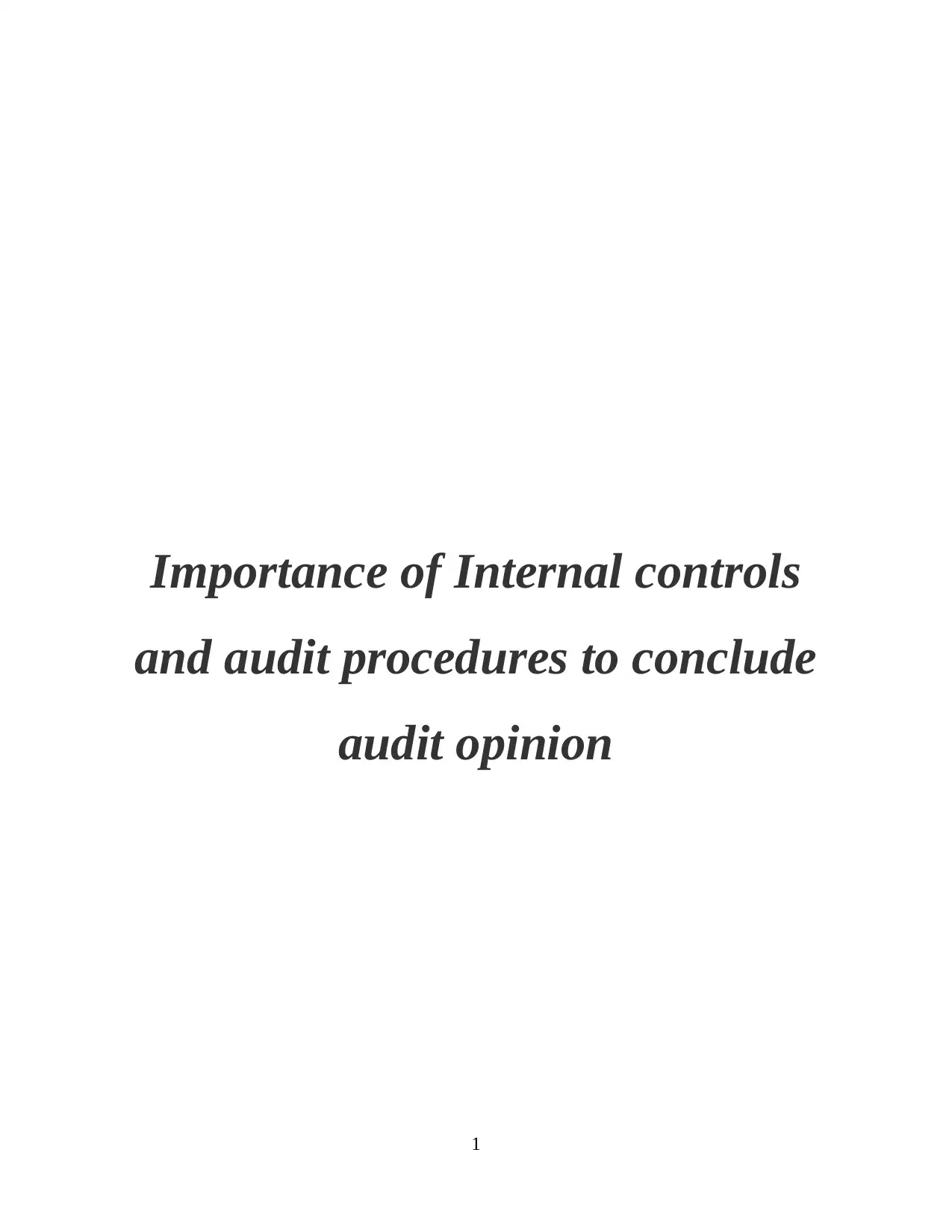
Importance of Internal controls
and audit procedures to conclude
audit opinion
1
and audit procedures to conclude
audit opinion
1
Paraphrase This Document
Need a fresh take? Get an instant paraphrase of this document with our AI Paraphraser
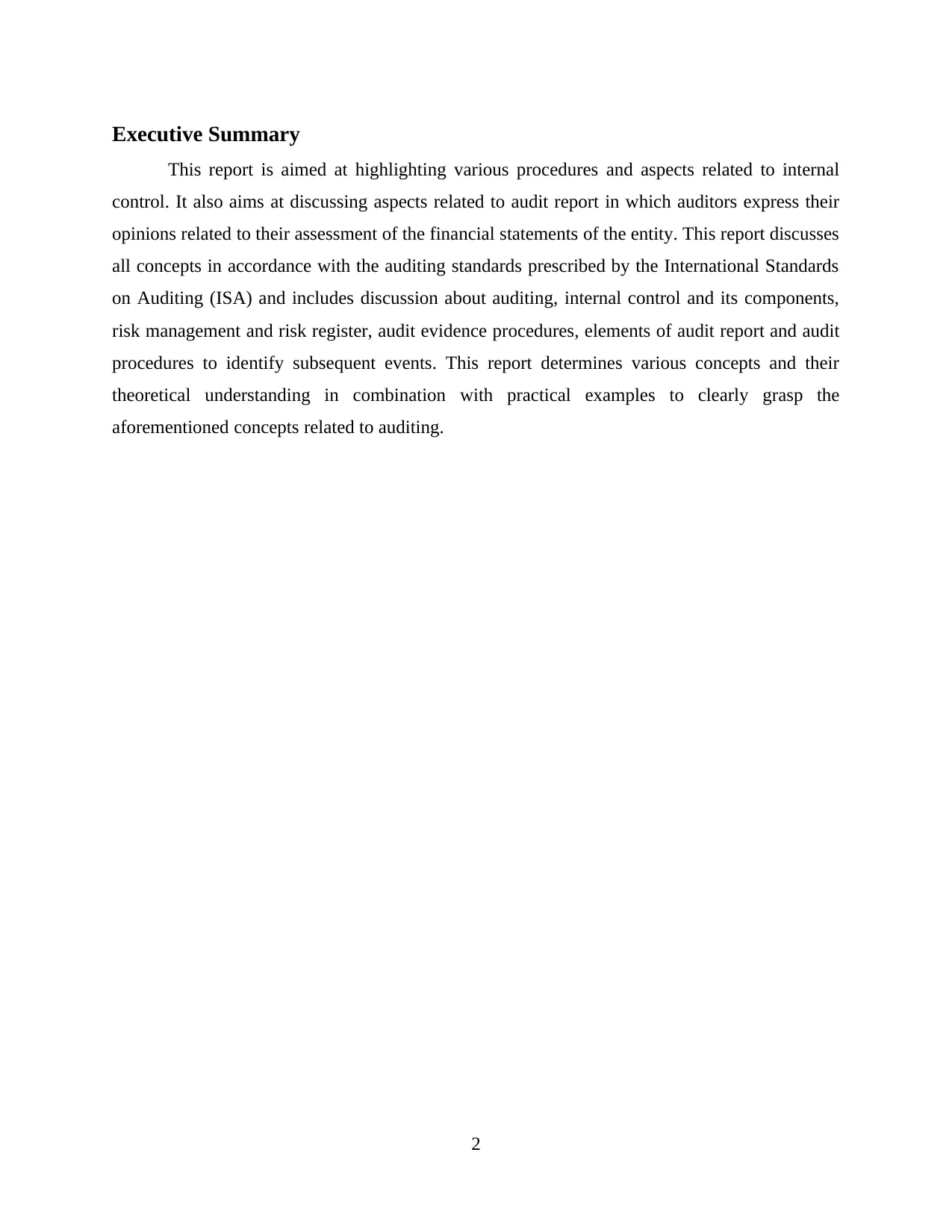
Executive Summary
This report is aimed at highlighting various procedures and aspects related to internal
control. It also aims at discussing aspects related to audit report in which auditors express their
opinions related to their assessment of the financial statements of the entity. This report discusses
all concepts in accordance with the auditing standards prescribed by the International Standards
on Auditing (ISA) and includes discussion about auditing, internal control and its components,
risk management and risk register, audit evidence procedures, elements of audit report and audit
procedures to identify subsequent events. This report determines various concepts and their
theoretical understanding in combination with practical examples to clearly grasp the
aforementioned concepts related to auditing.
2
This report is aimed at highlighting various procedures and aspects related to internal
control. It also aims at discussing aspects related to audit report in which auditors express their
opinions related to their assessment of the financial statements of the entity. This report discusses
all concepts in accordance with the auditing standards prescribed by the International Standards
on Auditing (ISA) and includes discussion about auditing, internal control and its components,
risk management and risk register, audit evidence procedures, elements of audit report and audit
procedures to identify subsequent events. This report determines various concepts and their
theoretical understanding in combination with practical examples to clearly grasp the
aforementioned concepts related to auditing.
2
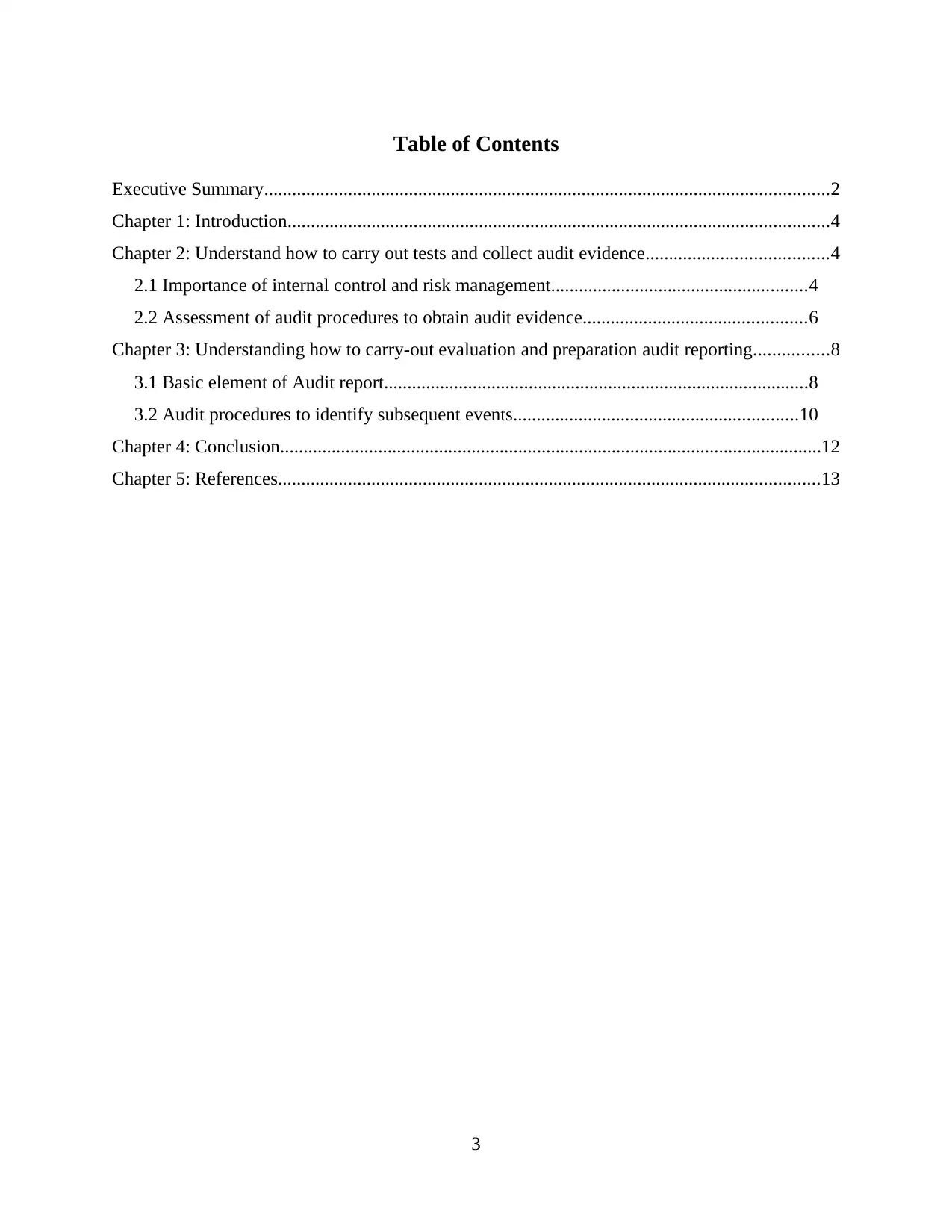
Table of Contents
Executive Summary.........................................................................................................................2
Chapter 1: Introduction....................................................................................................................4
Chapter 2: Understand how to carry out tests and collect audit evidence.......................................4
2.1 Importance of internal control and risk management.......................................................4
2.2 Assessment of audit procedures to obtain audit evidence................................................6
Chapter 3: Understanding how to carry-out evaluation and preparation audit reporting................8
3.1 Basic element of Audit report...........................................................................................8
3.2 Audit procedures to identify subsequent events.............................................................10
Chapter 4: Conclusion....................................................................................................................12
Chapter 5: References....................................................................................................................13
3
Executive Summary.........................................................................................................................2
Chapter 1: Introduction....................................................................................................................4
Chapter 2: Understand how to carry out tests and collect audit evidence.......................................4
2.1 Importance of internal control and risk management.......................................................4
2.2 Assessment of audit procedures to obtain audit evidence................................................6
Chapter 3: Understanding how to carry-out evaluation and preparation audit reporting................8
3.1 Basic element of Audit report...........................................................................................8
3.2 Audit procedures to identify subsequent events.............................................................10
Chapter 4: Conclusion....................................................................................................................12
Chapter 5: References....................................................................................................................13
3
⊘ This is a preview!⊘
Do you want full access?
Subscribe today to unlock all pages.

Trusted by 1+ million students worldwide
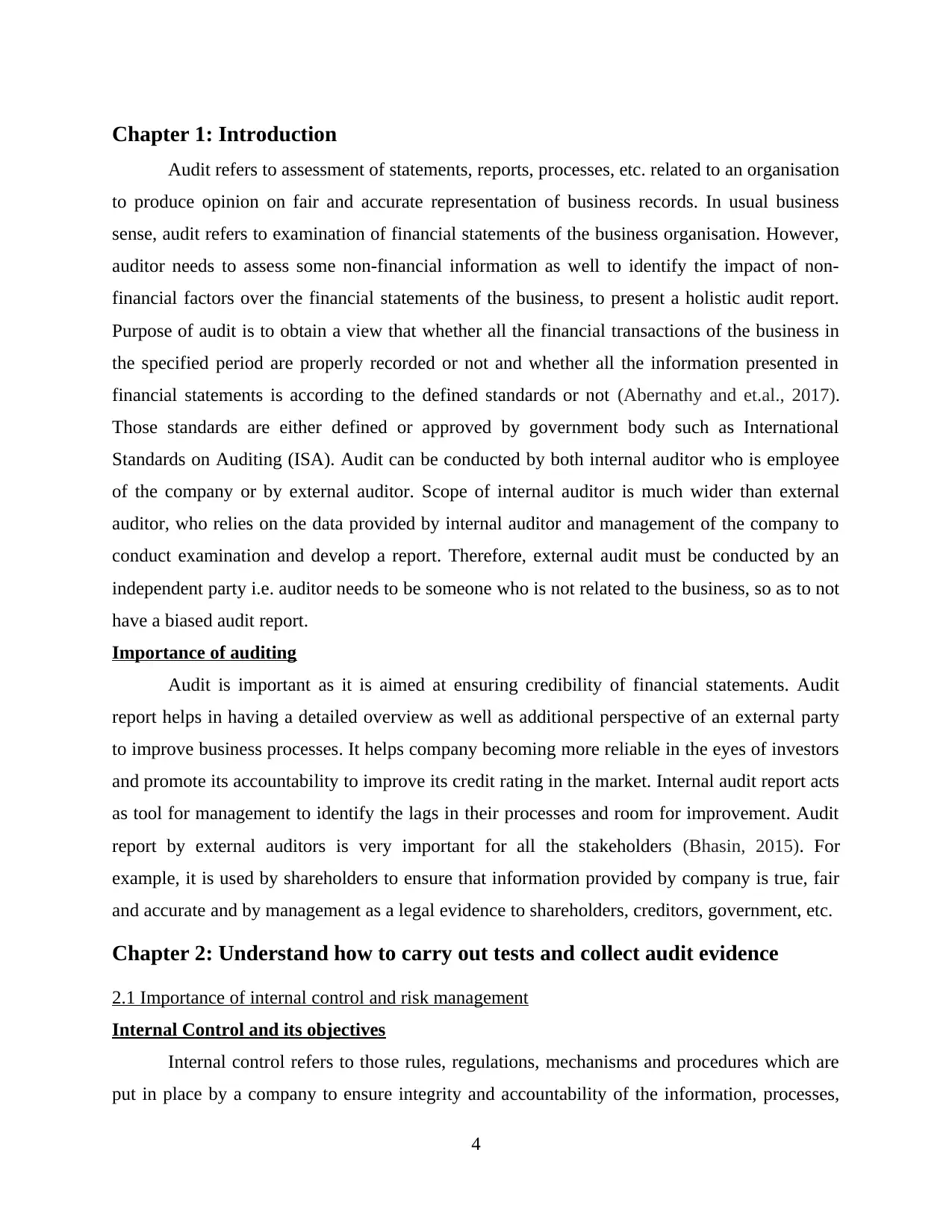
Chapter 1: Introduction
Audit refers to assessment of statements, reports, processes, etc. related to an organisation
to produce opinion on fair and accurate representation of business records. In usual business
sense, audit refers to examination of financial statements of the business organisation. However,
auditor needs to assess some non-financial information as well to identify the impact of non-
financial factors over the financial statements of the business, to present a holistic audit report.
Purpose of audit is to obtain a view that whether all the financial transactions of the business in
the specified period are properly recorded or not and whether all the information presented in
financial statements is according to the defined standards or not (Abernathy and et.al., 2017).
Those standards are either defined or approved by government body such as International
Standards on Auditing (ISA). Audit can be conducted by both internal auditor who is employee
of the company or by external auditor. Scope of internal auditor is much wider than external
auditor, who relies on the data provided by internal auditor and management of the company to
conduct examination and develop a report. Therefore, external audit must be conducted by an
independent party i.e. auditor needs to be someone who is not related to the business, so as to not
have a biased audit report.
Importance of auditing
Audit is important as it is aimed at ensuring credibility of financial statements. Audit
report helps in having a detailed overview as well as additional perspective of an external party
to improve business processes. It helps company becoming more reliable in the eyes of investors
and promote its accountability to improve its credit rating in the market. Internal audit report acts
as tool for management to identify the lags in their processes and room for improvement. Audit
report by external auditors is very important for all the stakeholders (Bhasin, 2015). For
example, it is used by shareholders to ensure that information provided by company is true, fair
and accurate and by management as a legal evidence to shareholders, creditors, government, etc.
Chapter 2: Understand how to carry out tests and collect audit evidence
2.1 Importance of internal control and risk management
Internal Control and its objectives
Internal control refers to those rules, regulations, mechanisms and procedures which are
put in place by a company to ensure integrity and accountability of the information, processes,
4
Audit refers to assessment of statements, reports, processes, etc. related to an organisation
to produce opinion on fair and accurate representation of business records. In usual business
sense, audit refers to examination of financial statements of the business organisation. However,
auditor needs to assess some non-financial information as well to identify the impact of non-
financial factors over the financial statements of the business, to present a holistic audit report.
Purpose of audit is to obtain a view that whether all the financial transactions of the business in
the specified period are properly recorded or not and whether all the information presented in
financial statements is according to the defined standards or not (Abernathy and et.al., 2017).
Those standards are either defined or approved by government body such as International
Standards on Auditing (ISA). Audit can be conducted by both internal auditor who is employee
of the company or by external auditor. Scope of internal auditor is much wider than external
auditor, who relies on the data provided by internal auditor and management of the company to
conduct examination and develop a report. Therefore, external audit must be conducted by an
independent party i.e. auditor needs to be someone who is not related to the business, so as to not
have a biased audit report.
Importance of auditing
Audit is important as it is aimed at ensuring credibility of financial statements. Audit
report helps in having a detailed overview as well as additional perspective of an external party
to improve business processes. It helps company becoming more reliable in the eyes of investors
and promote its accountability to improve its credit rating in the market. Internal audit report acts
as tool for management to identify the lags in their processes and room for improvement. Audit
report by external auditors is very important for all the stakeholders (Bhasin, 2015). For
example, it is used by shareholders to ensure that information provided by company is true, fair
and accurate and by management as a legal evidence to shareholders, creditors, government, etc.
Chapter 2: Understand how to carry out tests and collect audit evidence
2.1 Importance of internal control and risk management
Internal Control and its objectives
Internal control refers to those rules, regulations, mechanisms and procedures which are
put in place by a company to ensure integrity and accountability of the information, processes,
4
Paraphrase This Document
Need a fresh take? Get an instant paraphrase of this document with our AI Paraphraser
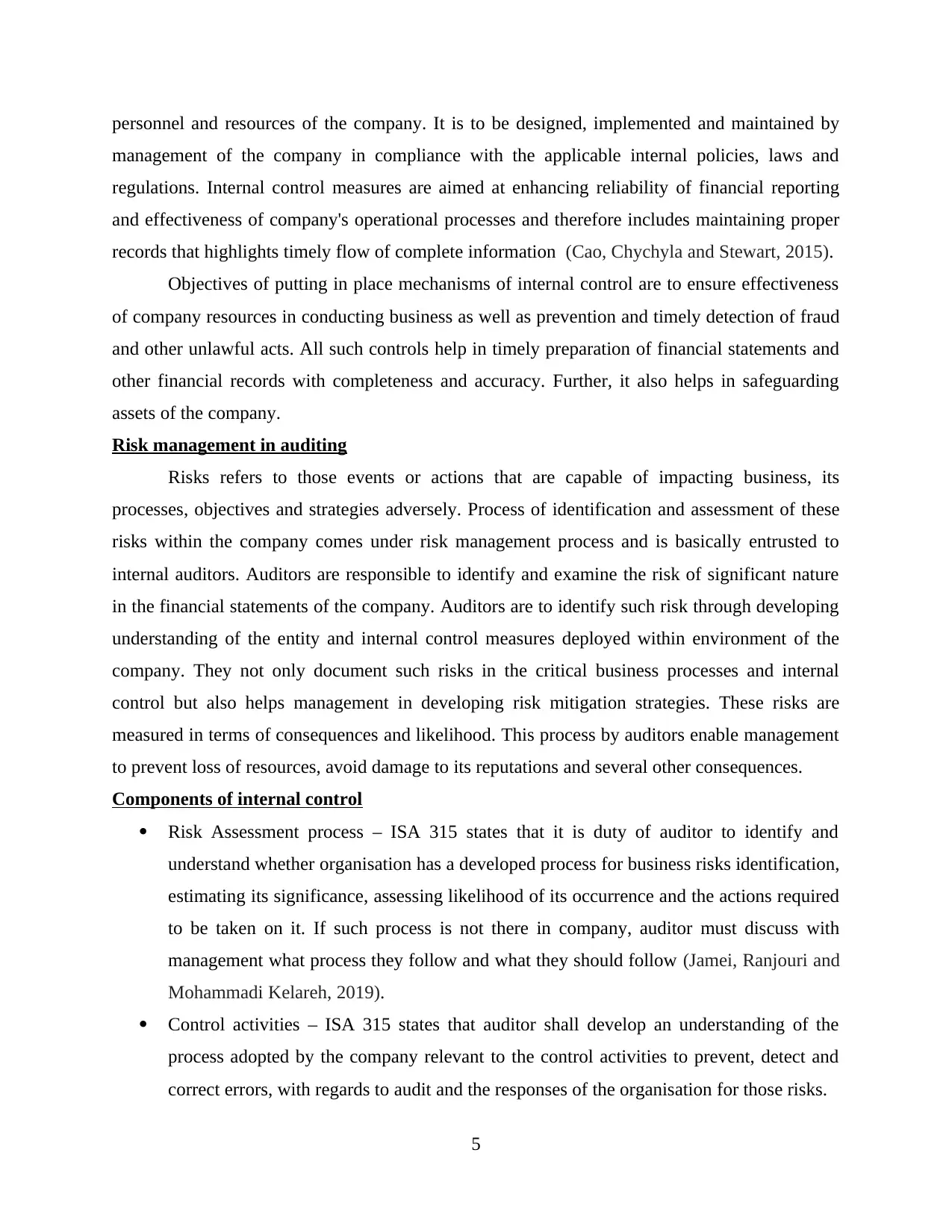
personnel and resources of the company. It is to be designed, implemented and maintained by
management of the company in compliance with the applicable internal policies, laws and
regulations. Internal control measures are aimed at enhancing reliability of financial reporting
and effectiveness of company's operational processes and therefore includes maintaining proper
records that highlights timely flow of complete information (Cao, Chychyla and Stewart, 2015).
Objectives of putting in place mechanisms of internal control are to ensure effectiveness
of company resources in conducting business as well as prevention and timely detection of fraud
and other unlawful acts. All such controls help in timely preparation of financial statements and
other financial records with completeness and accuracy. Further, it also helps in safeguarding
assets of the company.
Risk management in auditing
Risks refers to those events or actions that are capable of impacting business, its
processes, objectives and strategies adversely. Process of identification and assessment of these
risks within the company comes under risk management process and is basically entrusted to
internal auditors. Auditors are responsible to identify and examine the risk of significant nature
in the financial statements of the company. Auditors are to identify such risk through developing
understanding of the entity and internal control measures deployed within environment of the
company. They not only document such risks in the critical business processes and internal
control but also helps management in developing risk mitigation strategies. These risks are
measured in terms of consequences and likelihood. This process by auditors enable management
to prevent loss of resources, avoid damage to its reputations and several other consequences.
Components of internal control
Risk Assessment process – ISA 315 states that it is duty of auditor to identify and
understand whether organisation has a developed process for business risks identification,
estimating its significance, assessing likelihood of its occurrence and the actions required
to be taken on it. If such process is not there in company, auditor must discuss with
management what process they follow and what they should follow (Jamei, Ranjouri and
Mohammadi Kelareh, 2019).
Control activities – ISA 315 states that auditor shall develop an understanding of the
process adopted by the company relevant to the control activities to prevent, detect and
correct errors, with regards to audit and the responses of the organisation for those risks.
5
management of the company in compliance with the applicable internal policies, laws and
regulations. Internal control measures are aimed at enhancing reliability of financial reporting
and effectiveness of company's operational processes and therefore includes maintaining proper
records that highlights timely flow of complete information (Cao, Chychyla and Stewart, 2015).
Objectives of putting in place mechanisms of internal control are to ensure effectiveness
of company resources in conducting business as well as prevention and timely detection of fraud
and other unlawful acts. All such controls help in timely preparation of financial statements and
other financial records with completeness and accuracy. Further, it also helps in safeguarding
assets of the company.
Risk management in auditing
Risks refers to those events or actions that are capable of impacting business, its
processes, objectives and strategies adversely. Process of identification and assessment of these
risks within the company comes under risk management process and is basically entrusted to
internal auditors. Auditors are responsible to identify and examine the risk of significant nature
in the financial statements of the company. Auditors are to identify such risk through developing
understanding of the entity and internal control measures deployed within environment of the
company. They not only document such risks in the critical business processes and internal
control but also helps management in developing risk mitigation strategies. These risks are
measured in terms of consequences and likelihood. This process by auditors enable management
to prevent loss of resources, avoid damage to its reputations and several other consequences.
Components of internal control
Risk Assessment process – ISA 315 states that it is duty of auditor to identify and
understand whether organisation has a developed process for business risks identification,
estimating its significance, assessing likelihood of its occurrence and the actions required
to be taken on it. If such process is not there in company, auditor must discuss with
management what process they follow and what they should follow (Jamei, Ranjouri and
Mohammadi Kelareh, 2019).
Control activities – ISA 315 states that auditor shall develop an understanding of the
process adopted by the company relevant to the control activities to prevent, detect and
correct errors, with regards to audit and the responses of the organisation for those risks.
5
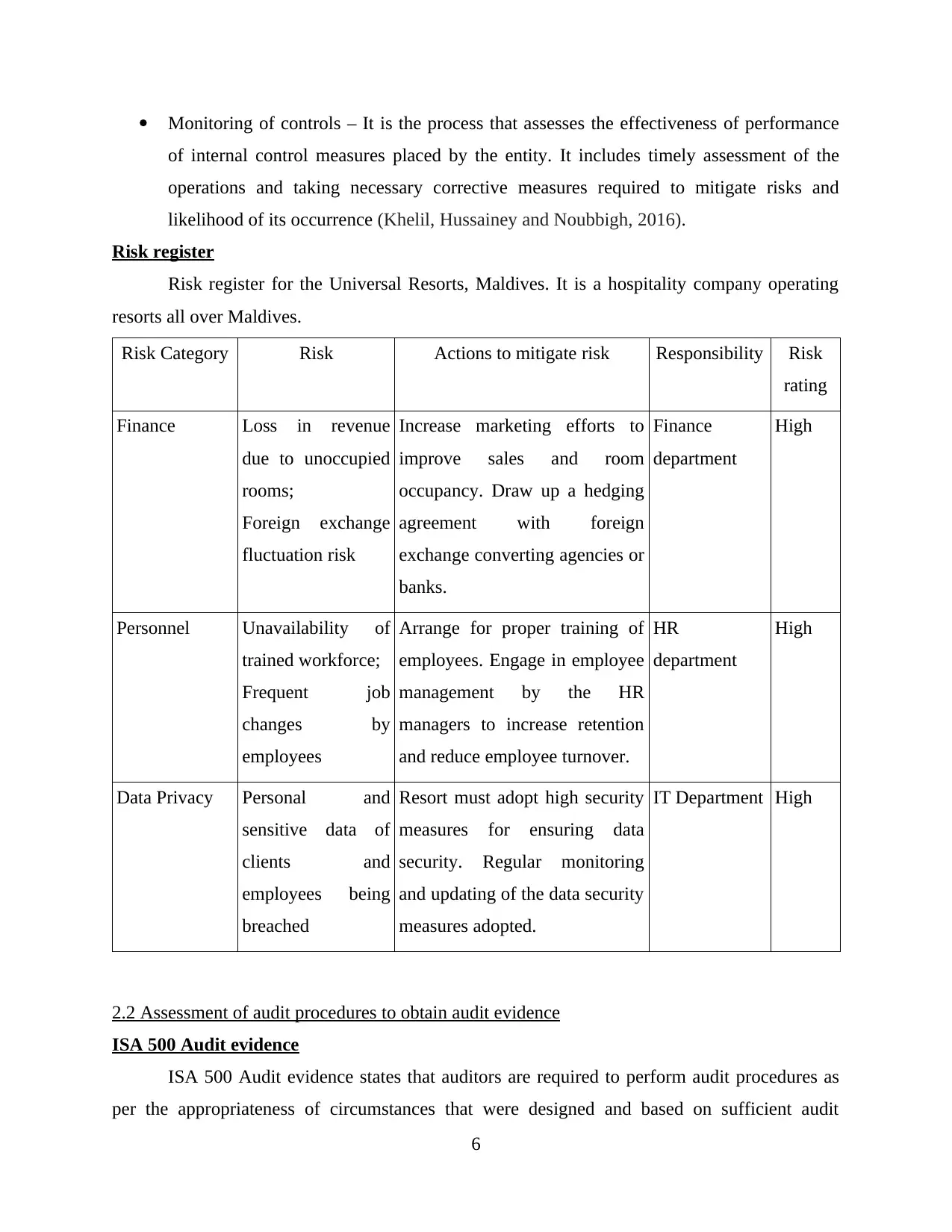
Monitoring of controls – It is the process that assesses the effectiveness of performance
of internal control measures placed by the entity. It includes timely assessment of the
operations and taking necessary corrective measures required to mitigate risks and
likelihood of its occurrence (Khelil, Hussainey and Noubbigh, 2016).
Risk register
Risk register for the Universal Resorts, Maldives. It is a hospitality company operating
resorts all over Maldives.
Risk Category Risk Actions to mitigate risk Responsibility Risk
rating
Finance Loss in revenue
due to unoccupied
rooms;
Foreign exchange
fluctuation risk
Increase marketing efforts to
improve sales and room
occupancy. Draw up a hedging
agreement with foreign
exchange converting agencies or
banks.
Finance
department
High
Personnel Unavailability of
trained workforce;
Frequent job
changes by
employees
Arrange for proper training of
employees. Engage in employee
management by the HR
managers to increase retention
and reduce employee turnover.
HR
department
High
Data Privacy Personal and
sensitive data of
clients and
employees being
breached
Resort must adopt high security
measures for ensuring data
security. Regular monitoring
and updating of the data security
measures adopted.
IT Department High
2.2 Assessment of audit procedures to obtain audit evidence
ISA 500 Audit evidence
ISA 500 Audit evidence states that auditors are required to perform audit procedures as
per the appropriateness of circumstances that were designed and based on sufficient audit
6
of internal control measures placed by the entity. It includes timely assessment of the
operations and taking necessary corrective measures required to mitigate risks and
likelihood of its occurrence (Khelil, Hussainey and Noubbigh, 2016).
Risk register
Risk register for the Universal Resorts, Maldives. It is a hospitality company operating
resorts all over Maldives.
Risk Category Risk Actions to mitigate risk Responsibility Risk
rating
Finance Loss in revenue
due to unoccupied
rooms;
Foreign exchange
fluctuation risk
Increase marketing efforts to
improve sales and room
occupancy. Draw up a hedging
agreement with foreign
exchange converting agencies or
banks.
Finance
department
High
Personnel Unavailability of
trained workforce;
Frequent job
changes by
employees
Arrange for proper training of
employees. Engage in employee
management by the HR
managers to increase retention
and reduce employee turnover.
HR
department
High
Data Privacy Personal and
sensitive data of
clients and
employees being
breached
Resort must adopt high security
measures for ensuring data
security. Regular monitoring
and updating of the data security
measures adopted.
IT Department High
2.2 Assessment of audit procedures to obtain audit evidence
ISA 500 Audit evidence
ISA 500 Audit evidence states that auditors are required to perform audit procedures as
per the appropriateness of circumstances that were designed and based on sufficient audit
6
⊘ This is a preview!⊘
Do you want full access?
Subscribe today to unlock all pages.

Trusted by 1+ million students worldwide
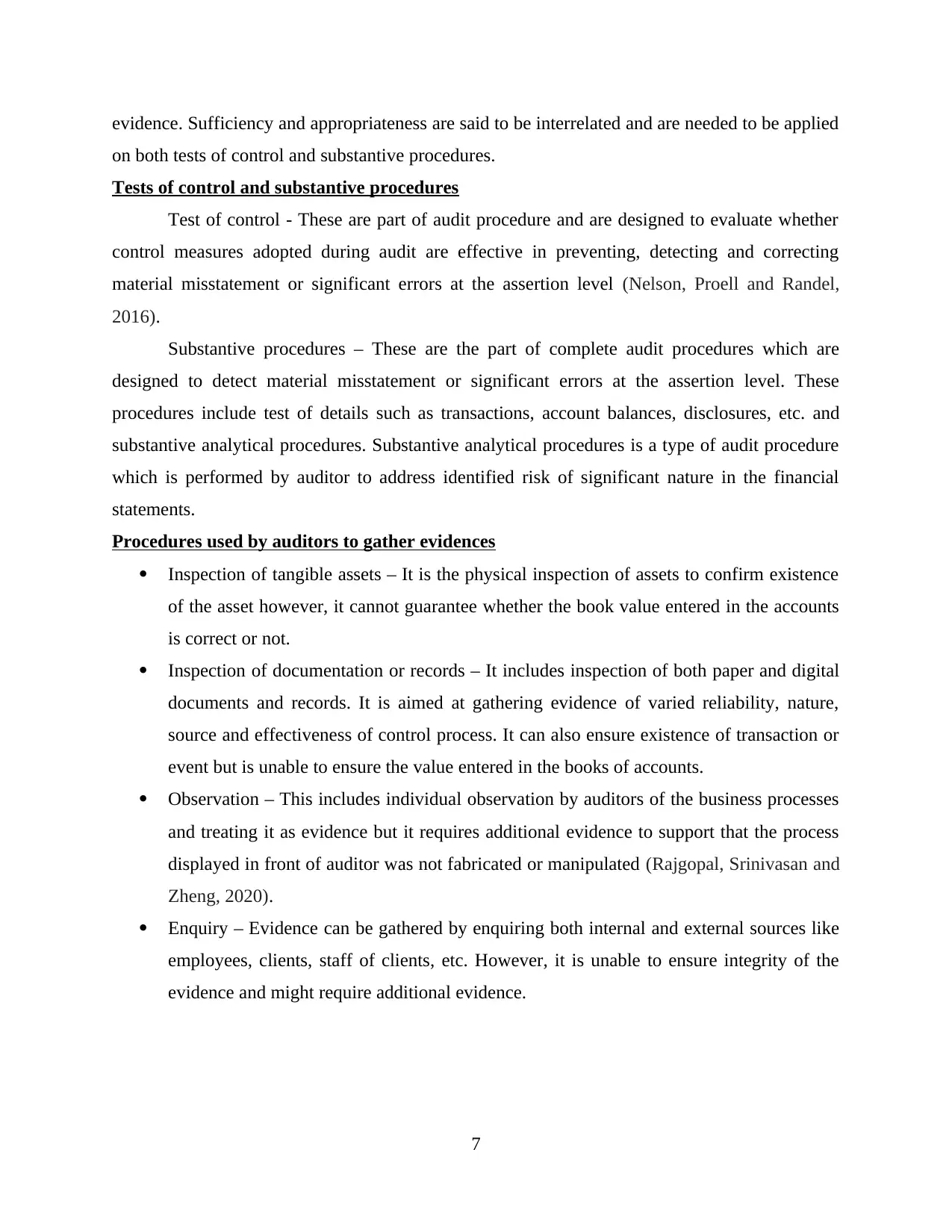
evidence. Sufficiency and appropriateness are said to be interrelated and are needed to be applied
on both tests of control and substantive procedures.
Tests of control and substantive procedures
Test of control - These are part of audit procedure and are designed to evaluate whether
control measures adopted during audit are effective in preventing, detecting and correcting
material misstatement or significant errors at the assertion level (Nelson, Proell and Randel,
2016).
Substantive procedures – These are the part of complete audit procedures which are
designed to detect material misstatement or significant errors at the assertion level. These
procedures include test of details such as transactions, account balances, disclosures, etc. and
substantive analytical procedures. Substantive analytical procedures is a type of audit procedure
which is performed by auditor to address identified risk of significant nature in the financial
statements.
Procedures used by auditors to gather evidences
Inspection of tangible assets – It is the physical inspection of assets to confirm existence
of the asset however, it cannot guarantee whether the book value entered in the accounts
is correct or not.
Inspection of documentation or records – It includes inspection of both paper and digital
documents and records. It is aimed at gathering evidence of varied reliability, nature,
source and effectiveness of control process. It can also ensure existence of transaction or
event but is unable to ensure the value entered in the books of accounts.
Observation – This includes individual observation by auditors of the business processes
and treating it as evidence but it requires additional evidence to support that the process
displayed in front of auditor was not fabricated or manipulated (Rajgopal, Srinivasan and
Zheng, 2020).
Enquiry – Evidence can be gathered by enquiring both internal and external sources like
employees, clients, staff of clients, etc. However, it is unable to ensure integrity of the
evidence and might require additional evidence.
7
on both tests of control and substantive procedures.
Tests of control and substantive procedures
Test of control - These are part of audit procedure and are designed to evaluate whether
control measures adopted during audit are effective in preventing, detecting and correcting
material misstatement or significant errors at the assertion level (Nelson, Proell and Randel,
2016).
Substantive procedures – These are the part of complete audit procedures which are
designed to detect material misstatement or significant errors at the assertion level. These
procedures include test of details such as transactions, account balances, disclosures, etc. and
substantive analytical procedures. Substantive analytical procedures is a type of audit procedure
which is performed by auditor to address identified risk of significant nature in the financial
statements.
Procedures used by auditors to gather evidences
Inspection of tangible assets – It is the physical inspection of assets to confirm existence
of the asset however, it cannot guarantee whether the book value entered in the accounts
is correct or not.
Inspection of documentation or records – It includes inspection of both paper and digital
documents and records. It is aimed at gathering evidence of varied reliability, nature,
source and effectiveness of control process. It can also ensure existence of transaction or
event but is unable to ensure the value entered in the books of accounts.
Observation – This includes individual observation by auditors of the business processes
and treating it as evidence but it requires additional evidence to support that the process
displayed in front of auditor was not fabricated or manipulated (Rajgopal, Srinivasan and
Zheng, 2020).
Enquiry – Evidence can be gathered by enquiring both internal and external sources like
employees, clients, staff of clients, etc. However, it is unable to ensure integrity of the
evidence and might require additional evidence.
7
Paraphrase This Document
Need a fresh take? Get an instant paraphrase of this document with our AI Paraphraser
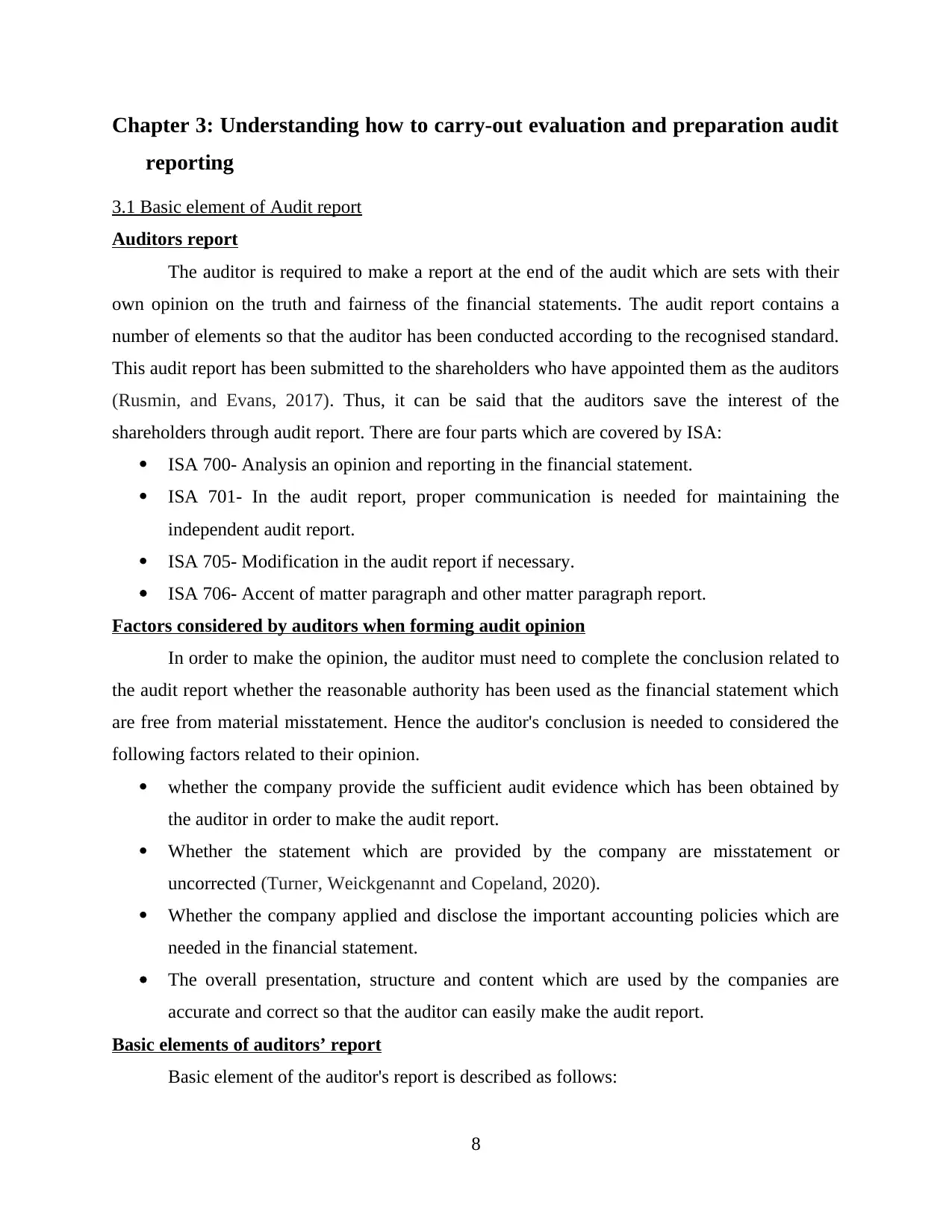
Chapter 3: Understanding how to carry-out evaluation and preparation audit
reporting
3.1 Basic element of Audit report
Auditors report
The auditor is required to make a report at the end of the audit which are sets with their
own opinion on the truth and fairness of the financial statements. The audit report contains a
number of elements so that the auditor has been conducted according to the recognised standard.
This audit report has been submitted to the shareholders who have appointed them as the auditors
(Rusmin, and Evans, 2017). Thus, it can be said that the auditors save the interest of the
shareholders through audit report. There are four parts which are covered by ISA:
ISA 700- Analysis an opinion and reporting in the financial statement.
ISA 701- In the audit report, proper communication is needed for maintaining the
independent audit report.
ISA 705- Modification in the audit report if necessary.
ISA 706- Accent of matter paragraph and other matter paragraph report.
Factors considered by auditors when forming audit opinion
In order to make the opinion, the auditor must need to complete the conclusion related to
the audit report whether the reasonable authority has been used as the financial statement which
are free from material misstatement. Hence the auditor's conclusion is needed to considered the
following factors related to their opinion.
whether the company provide the sufficient audit evidence which has been obtained by
the auditor in order to make the audit report.
Whether the statement which are provided by the company are misstatement or
uncorrected (Turner, Weickgenannt and Copeland, 2020).
Whether the company applied and disclose the important accounting policies which are
needed in the financial statement.
The overall presentation, structure and content which are used by the companies are
accurate and correct so that the auditor can easily make the audit report.
Basic elements of auditors’ report
Basic element of the auditor's report is described as follows:
8
reporting
3.1 Basic element of Audit report
Auditors report
The auditor is required to make a report at the end of the audit which are sets with their
own opinion on the truth and fairness of the financial statements. The audit report contains a
number of elements so that the auditor has been conducted according to the recognised standard.
This audit report has been submitted to the shareholders who have appointed them as the auditors
(Rusmin, and Evans, 2017). Thus, it can be said that the auditors save the interest of the
shareholders through audit report. There are four parts which are covered by ISA:
ISA 700- Analysis an opinion and reporting in the financial statement.
ISA 701- In the audit report, proper communication is needed for maintaining the
independent audit report.
ISA 705- Modification in the audit report if necessary.
ISA 706- Accent of matter paragraph and other matter paragraph report.
Factors considered by auditors when forming audit opinion
In order to make the opinion, the auditor must need to complete the conclusion related to
the audit report whether the reasonable authority has been used as the financial statement which
are free from material misstatement. Hence the auditor's conclusion is needed to considered the
following factors related to their opinion.
whether the company provide the sufficient audit evidence which has been obtained by
the auditor in order to make the audit report.
Whether the statement which are provided by the company are misstatement or
uncorrected (Turner, Weickgenannt and Copeland, 2020).
Whether the company applied and disclose the important accounting policies which are
needed in the financial statement.
The overall presentation, structure and content which are used by the companies are
accurate and correct so that the auditor can easily make the audit report.
Basic elements of auditors’ report
Basic element of the auditor's report is described as follows:
8
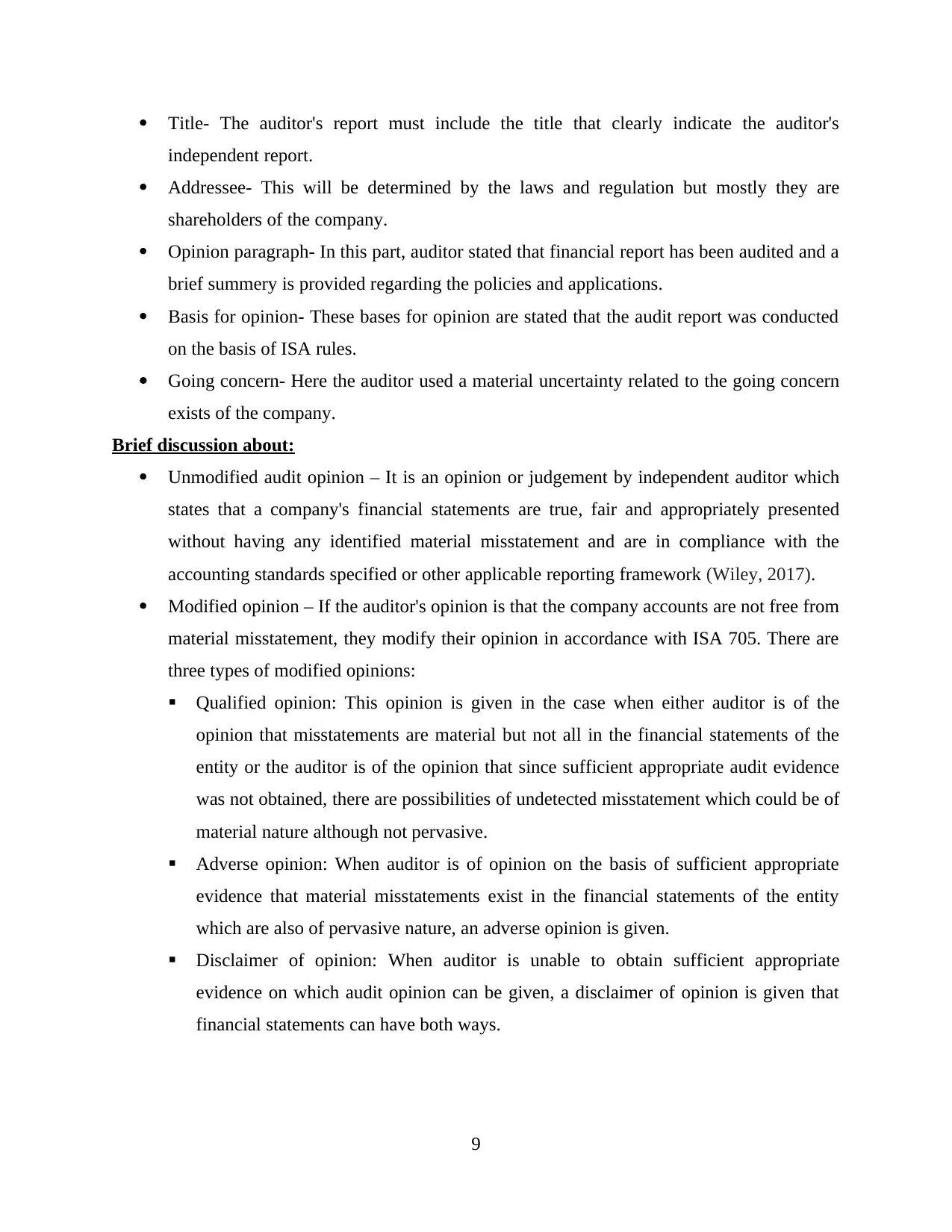
Title- The auditor's report must include the title that clearly indicate the auditor's
independent report.
Addressee- This will be determined by the laws and regulation but mostly they are
shareholders of the company.
Opinion paragraph- In this part, auditor stated that financial report has been audited and a
brief summery is provided regarding the policies and applications.
Basis for opinion- These bases for opinion are stated that the audit report was conducted
on the basis of ISA rules.
Going concern- Here the auditor used a material uncertainty related to the going concern
exists of the company.
Brief discussion about:
Unmodified audit opinion – It is an opinion or judgement by independent auditor which
states that a company's financial statements are true, fair and appropriately presented
without having any identified material misstatement and are in compliance with the
accounting standards specified or other applicable reporting framework (Wiley, 2017).
Modified opinion – If the auditor's opinion is that the company accounts are not free from
material misstatement, they modify their opinion in accordance with ISA 705. There are
three types of modified opinions:
Qualified opinion: This opinion is given in the case when either auditor is of the
opinion that misstatements are material but not all in the financial statements of the
entity or the auditor is of the opinion that since sufficient appropriate audit evidence
was not obtained, there are possibilities of undetected misstatement which could be of
material nature although not pervasive.
Adverse opinion: When auditor is of opinion on the basis of sufficient appropriate
evidence that material misstatements exist in the financial statements of the entity
which are also of pervasive nature, an adverse opinion is given.
Disclaimer of opinion: When auditor is unable to obtain sufficient appropriate
evidence on which audit opinion can be given, a disclaimer of opinion is given that
financial statements can have both ways.
9
independent report.
Addressee- This will be determined by the laws and regulation but mostly they are
shareholders of the company.
Opinion paragraph- In this part, auditor stated that financial report has been audited and a
brief summery is provided regarding the policies and applications.
Basis for opinion- These bases for opinion are stated that the audit report was conducted
on the basis of ISA rules.
Going concern- Here the auditor used a material uncertainty related to the going concern
exists of the company.
Brief discussion about:
Unmodified audit opinion – It is an opinion or judgement by independent auditor which
states that a company's financial statements are true, fair and appropriately presented
without having any identified material misstatement and are in compliance with the
accounting standards specified or other applicable reporting framework (Wiley, 2017).
Modified opinion – If the auditor's opinion is that the company accounts are not free from
material misstatement, they modify their opinion in accordance with ISA 705. There are
three types of modified opinions:
Qualified opinion: This opinion is given in the case when either auditor is of the
opinion that misstatements are material but not all in the financial statements of the
entity or the auditor is of the opinion that since sufficient appropriate audit evidence
was not obtained, there are possibilities of undetected misstatement which could be of
material nature although not pervasive.
Adverse opinion: When auditor is of opinion on the basis of sufficient appropriate
evidence that material misstatements exist in the financial statements of the entity
which are also of pervasive nature, an adverse opinion is given.
Disclaimer of opinion: When auditor is unable to obtain sufficient appropriate
evidence on which audit opinion can be given, a disclaimer of opinion is given that
financial statements can have both ways.
9
⊘ This is a preview!⊘
Do you want full access?
Subscribe today to unlock all pages.

Trusted by 1+ million students worldwide
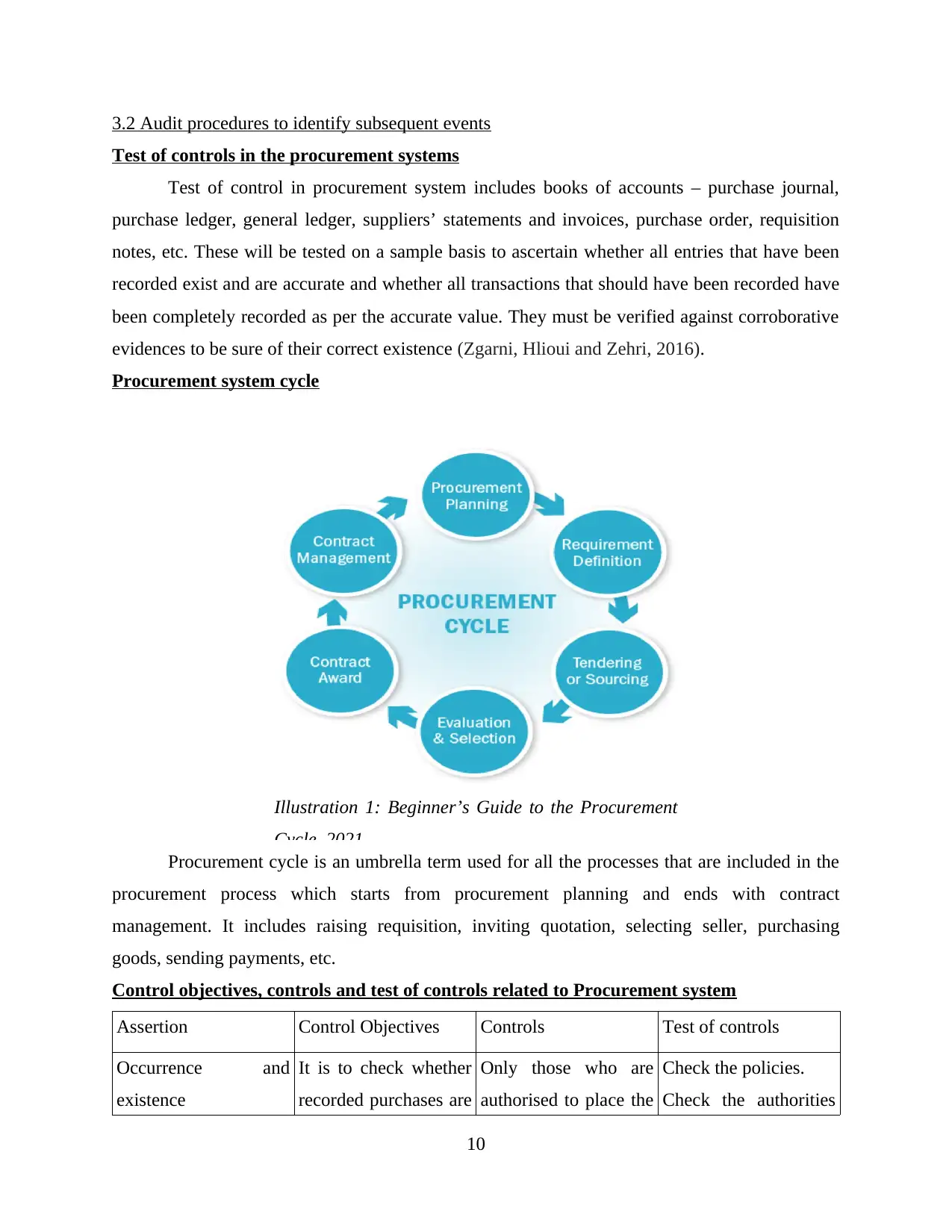
3.2 Audit procedures to identify subsequent events
Test of controls in the procurement systems
Test of control in procurement system includes books of accounts – purchase journal,
purchase ledger, general ledger, suppliers’ statements and invoices, purchase order, requisition
notes, etc. These will be tested on a sample basis to ascertain whether all entries that have been
recorded exist and are accurate and whether all transactions that should have been recorded have
been completely recorded as per the accurate value. They must be verified against corroborative
evidences to be sure of their correct existence (Zgarni, Hlioui and Zehri, 2016).
Procurement system cycle
Procurement cycle is an umbrella term used for all the processes that are included in the
procurement process which starts from procurement planning and ends with contract
management. It includes raising requisition, inviting quotation, selecting seller, purchasing
goods, sending payments, etc.
Control objectives, controls and test of controls related to Procurement system
Assertion Control Objectives Controls Test of controls
Occurrence and
existence
It is to check whether
recorded purchases are
Only those who are
authorised to place the
Check the policies.
Check the authorities
10
Illustration 1: Beginner’s Guide to the Procurement
Cycle, 2021
Test of controls in the procurement systems
Test of control in procurement system includes books of accounts – purchase journal,
purchase ledger, general ledger, suppliers’ statements and invoices, purchase order, requisition
notes, etc. These will be tested on a sample basis to ascertain whether all entries that have been
recorded exist and are accurate and whether all transactions that should have been recorded have
been completely recorded as per the accurate value. They must be verified against corroborative
evidences to be sure of their correct existence (Zgarni, Hlioui and Zehri, 2016).
Procurement system cycle
Procurement cycle is an umbrella term used for all the processes that are included in the
procurement process which starts from procurement planning and ends with contract
management. It includes raising requisition, inviting quotation, selecting seller, purchasing
goods, sending payments, etc.
Control objectives, controls and test of controls related to Procurement system
Assertion Control Objectives Controls Test of controls
Occurrence and
existence
It is to check whether
recorded purchases are
Only those who are
authorised to place the
Check the policies.
Check the authorities
10
Illustration 1: Beginner’s Guide to the Procurement
Cycle, 2021
Paraphrase This Document
Need a fresh take? Get an instant paraphrase of this document with our AI Paraphraser
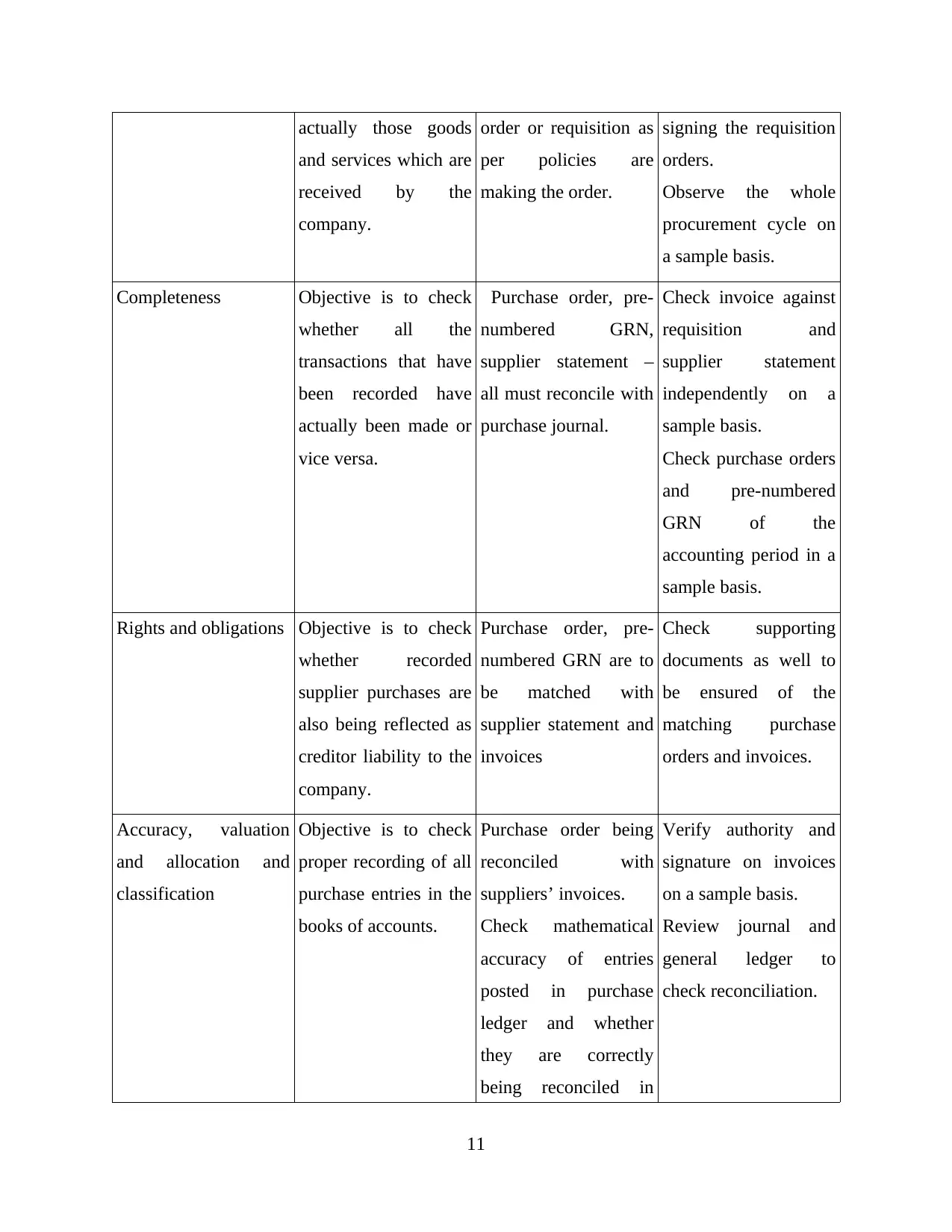
actually those goods
and services which are
received by the
company.
order or requisition as
per policies are
making the order.
signing the requisition
orders.
Observe the whole
procurement cycle on
a sample basis.
Completeness Objective is to check
whether all the
transactions that have
been recorded have
actually been made or
vice versa.
Purchase order, pre-
numbered GRN,
supplier statement –
all must reconcile with
purchase journal.
Check invoice against
requisition and
supplier statement
independently on a
sample basis.
Check purchase orders
and pre-numbered
GRN of the
accounting period in a
sample basis.
Rights and obligations Objective is to check
whether recorded
supplier purchases are
also being reflected as
creditor liability to the
company.
Purchase order, pre-
numbered GRN are to
be matched with
supplier statement and
invoices
Check supporting
documents as well to
be ensured of the
matching purchase
orders and invoices.
Accuracy, valuation
and allocation and
classification
Objective is to check
proper recording of all
purchase entries in the
books of accounts.
Purchase order being
reconciled with
suppliers’ invoices.
Check mathematical
accuracy of entries
posted in purchase
ledger and whether
they are correctly
being reconciled in
Verify authority and
signature on invoices
on a sample basis.
Review journal and
general ledger to
check reconciliation.
11
and services which are
received by the
company.
order or requisition as
per policies are
making the order.
signing the requisition
orders.
Observe the whole
procurement cycle on
a sample basis.
Completeness Objective is to check
whether all the
transactions that have
been recorded have
actually been made or
vice versa.
Purchase order, pre-
numbered GRN,
supplier statement –
all must reconcile with
purchase journal.
Check invoice against
requisition and
supplier statement
independently on a
sample basis.
Check purchase orders
and pre-numbered
GRN of the
accounting period in a
sample basis.
Rights and obligations Objective is to check
whether recorded
supplier purchases are
also being reflected as
creditor liability to the
company.
Purchase order, pre-
numbered GRN are to
be matched with
supplier statement and
invoices
Check supporting
documents as well to
be ensured of the
matching purchase
orders and invoices.
Accuracy, valuation
and allocation and
classification
Objective is to check
proper recording of all
purchase entries in the
books of accounts.
Purchase order being
reconciled with
suppliers’ invoices.
Check mathematical
accuracy of entries
posted in purchase
ledger and whether
they are correctly
being reconciled in
Verify authority and
signature on invoices
on a sample basis.
Review journal and
general ledger to
check reconciliation.
11
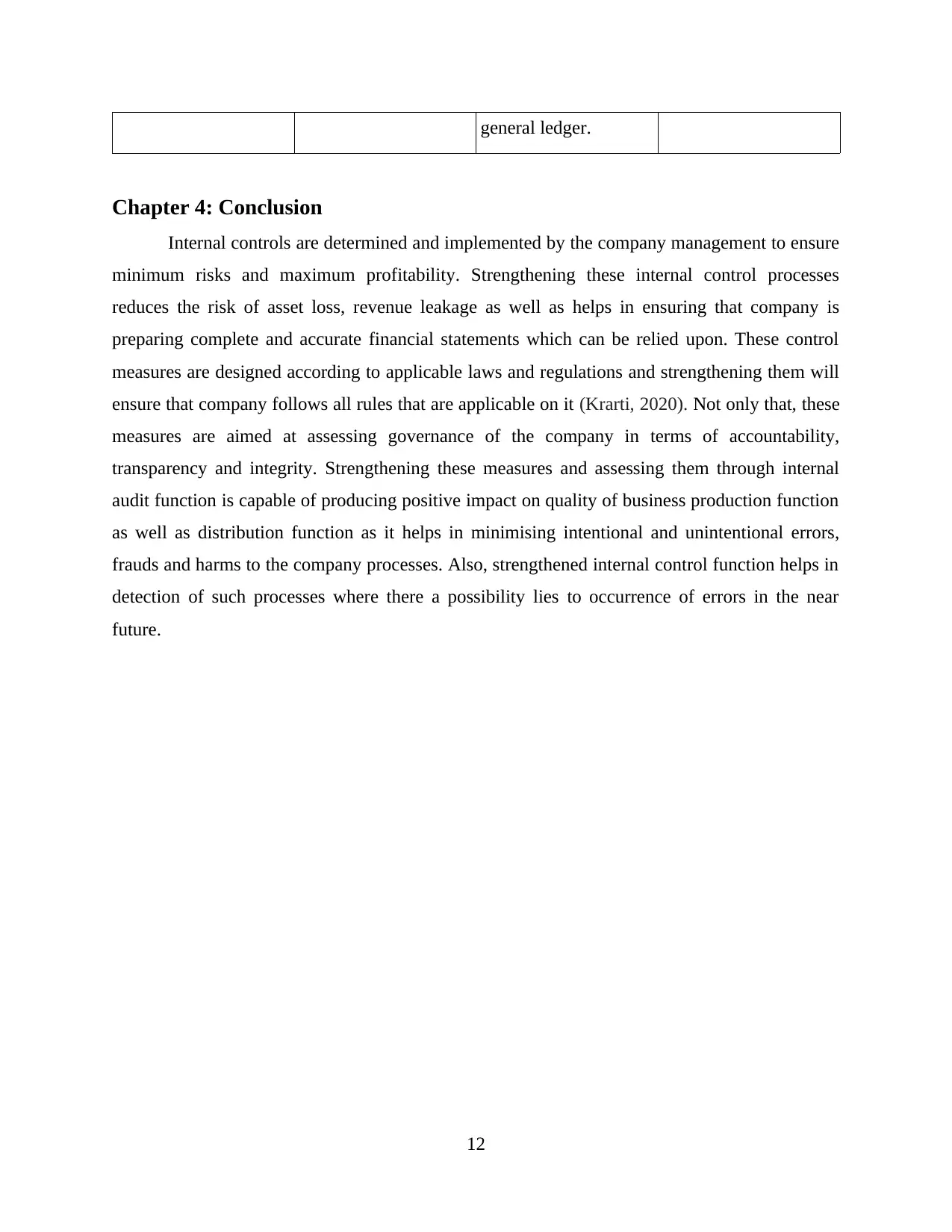
general ledger.
Chapter 4: Conclusion
Internal controls are determined and implemented by the company management to ensure
minimum risks and maximum profitability. Strengthening these internal control processes
reduces the risk of asset loss, revenue leakage as well as helps in ensuring that company is
preparing complete and accurate financial statements which can be relied upon. These control
measures are designed according to applicable laws and regulations and strengthening them will
ensure that company follows all rules that are applicable on it (Krarti, 2020). Not only that, these
measures are aimed at assessing governance of the company in terms of accountability,
transparency and integrity. Strengthening these measures and assessing them through internal
audit function is capable of producing positive impact on quality of business production function
as well as distribution function as it helps in minimising intentional and unintentional errors,
frauds and harms to the company processes. Also, strengthened internal control function helps in
detection of such processes where there a possibility lies to occurrence of errors in the near
future.
12
Chapter 4: Conclusion
Internal controls are determined and implemented by the company management to ensure
minimum risks and maximum profitability. Strengthening these internal control processes
reduces the risk of asset loss, revenue leakage as well as helps in ensuring that company is
preparing complete and accurate financial statements which can be relied upon. These control
measures are designed according to applicable laws and regulations and strengthening them will
ensure that company follows all rules that are applicable on it (Krarti, 2020). Not only that, these
measures are aimed at assessing governance of the company in terms of accountability,
transparency and integrity. Strengthening these measures and assessing them through internal
audit function is capable of producing positive impact on quality of business production function
as well as distribution function as it helps in minimising intentional and unintentional errors,
frauds and harms to the company processes. Also, strengthened internal control function helps in
detection of such processes where there a possibility lies to occurrence of errors in the near
future.
12
⊘ This is a preview!⊘
Do you want full access?
Subscribe today to unlock all pages.

Trusted by 1+ million students worldwide
1 out of 13
Related Documents
Your All-in-One AI-Powered Toolkit for Academic Success.
+13062052269
info@desklib.com
Available 24*7 on WhatsApp / Email
![[object Object]](/_next/static/media/star-bottom.7253800d.svg)
Unlock your academic potential
Copyright © 2020–2026 A2Z Services. All Rights Reserved. Developed and managed by ZUCOL.




